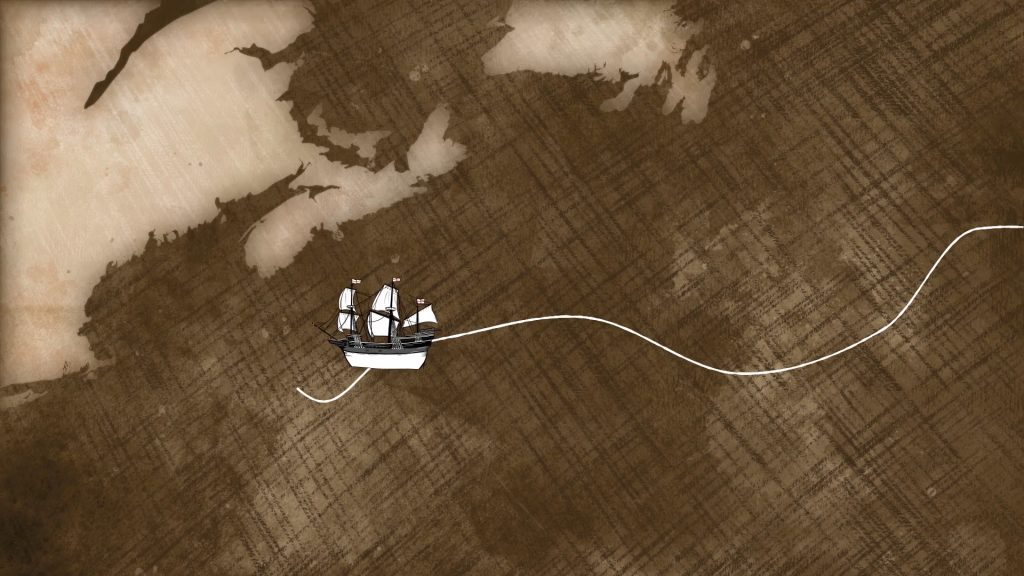Coming to America

The Mayflower set sail for Virginia in September 1620 with around 130 passengers and crew. In late
November, the ship sighted land – but they were further north than planned. After a long voyage across the
Atlantic, the Pilgrims were just off the coast of Massachusetts.
Pilgrim diarist William Bradford recalled the drama of the Pilgrims’ voyage:
“After they had enjoyed fair winds and weather…, they … encountered many times … cross winds, and met
with many fierce storms, with which the ship was … shaken, and her upper works made very leaky; and
one of the main beams in the mid-ships was bowed & creaked, which put them in some fear that the ship could not … perform the voyage.So some of the [leaders], perceiving the mariners [feared] the sufficiency of the ship, as appeared by their mutterings, they entered into serious consultation with the master & other officers of the ship, to consider … the danger; and [whether] to return [rather] than to cast themselves into a desperate & inevitable peril.
And truly there was great distraction & difference of opinion amongst the mariners themselves … the master & others affirmed they knew the ship to be strong & firm under water; and for the buckling of the main beam, there was a great iron screw the passengers brought out of Holland, which would raise the beam into his place; the which being done, the carpenter & master affirmed that with a post put under it … he would [fix it]. …
So they committed themselves to the will of God, & resolved to proceed. In [many] of these storms the winds were so fierce, & the seas so high, as they could not bear a knot of sail, but were forced to hull [drift without sails], for [many] days together.”
Bradford recalled ‘a special work of God’s providence’, which gives some insight into how the Separatists
viewed the world and their relationship to God:
“There was a proud & very profane young man, one of the sea-men, of … able body, which made him the more haughty; he would always be condemning the poor people in their sickness, & cursing them daily with egregious execrations [curses], and [told them] that he hoped to help to cast half of them overboard before they came to their journey’s end, and to make merry with what they had; and if he were by any gently reproved, he would curse and swear most bitterly.
But it pleased God before they came half [way], to smite this young man with a grievous disease, of which he died in a desperate manner, and so was himself the first that was thrown overboard. … it was an astonishment to all his fellows [the crew], for they noted it to be the just hand of God upon him.”
Eventually they came to Cape Cod, and ‘they were not a little joyful’:
“After some deliberation … they tacked about and resolved to [head] southward (the wind & weather being fair) to find some place about Hudson’s river for their habitation.
But after they had sailed that course about half the day, they fell amongst dangerous shoals and roaring breakers, and they were so far entangled there [they thought they were] in great danger; … they resolved to [go] up again for the Cape, and [were] happy to get out of those dangers before night overtook them, as by God’s providence they did.
And the next day they got into the Cape-harbour [and] safety. … Being thus arrived in a good harbour and brought safe to land, they fell upon their knees & blessed the God of heaven, who had brought them over the vast & furious ocean, and delivered them from all the perils & miseries thereof, again to set their feet on the firm and stable earth, their proper element. …
But here I cannot but … pause, and stand half amazed at this poor people’s present condition … Being thus passed the vast ocean, and a sea of troubles before in their preparation … they had now no friends to welcome them, nor inns to entertain or refresh their weather-beaten bodies, no houses or much less town to [go] to, to seek … succour.”
And so began their lives in America. In the final PilgrimAGE post, we’ll find out about their early struggles, a
need for a legal agreement, and their reliance on Native American help to survive.
Next week: Compact – our PilgrimAGE blog series draws to a close…